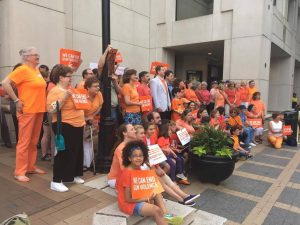Gun violence in America can’t be the new normal
June 12, 2016
I am not qualified to write on this subject. I am a high school student, but here I am, penning an article on gun violence. It’s not even an article; it’s a blog post—something personal by definition, because gun violence has become personal for every single person in the United States.

This morning, the nation learned of another tragedy—that word, “another,” stings. I have been repeating the facts all day, numbness coating each word. Last night, at Pulse—a gay nightclub in Orlando, Florida—a gunman killed 50 and wounded 53 more. It has been called the worst mass shooting in American history.
There are no words to express the horror, the devastation and the grief, but we have become well-versed in the proper reaction to this kind of tragedy.
Facebook has already filled with posts asking for thoughts and prayers, many with the hashtag #OrlandoStrong. Others have renewed calls for the reform of gun control legislation, drawing on this incident as the latest in a long line of tragedies that we label as something else: wake-up calls.
I’m sorry to report this, but the nation is still asleep.
The list is familiar, too familiar, spanning a decade and a half of violence: Columbine, Virginia Tech, Aurora, Sandy Hook, Charleston, San Bernardino. Today, we add the name of another place scarred by gun violence: Orlando. Today, activists and politicians will raise their voices a little louder in the fight to ban assault rifles. Today, Americans will shake their heads and say, “It happened again.”
Throughout his seven years in office, President Barack Obama has addressed the nation after 13 separate incidents of gun violence. His once-tearful reactions have lost their zeal. Today, he was stoic.
But this is more than “another” shooting, more than politics. This is a tragedy, and I am afraid that we may have forgotten that.
It’s not our fault; as a nation, we witness mass shootings more days than not. In 2015, at least one mass shooting—defined as an incident in which at least four people, not counting the shooter, are shot—occurred on 221 of 365 days, according to the Gun Violence Archive (GVA). That’s over 60 percent of the days in the year, resulting in a total of 471 deaths and leaving more than one thousand injured, perhaps altering the course of their lives forever.
The GVA keeps another record of every incident of gun violence that has occurred in the last 72 hours. This afternoon, there were nine pages of incidents to scroll through, including the massacre in Orlando. It happens every day, everywhere. It’s only natural that we have become jaded, and allowed for the normalization of senseless killings.
Just last month, the gun violence epidemic entered Montgomery County, our home. It may not have felt massive, but it met the threshold for a mass shooting—four civilians were shot, two of them killed. It felt different for it to be right here, in our community, at a mall that we have all been to. It was jarring, tragic. But a month has passed, and it seems we’ve all but forgotten, because it was just another shooting, and nothing was done—please, don’t accept this.
It has become a forgone conclusion that politics is too polarized, too broken, for reform. This morning, a friend told me to cheer up—if I was going to be sad over every shooting, I’d never get anywhere. This is just how it is.
This indifferent, hopeless mindset—and the fact that I understood where she was coming from—terrified me just as much as the violence.
The minute we forget how to grieve these tragedies, as common as they may be, is the moment we lose some of our humanity and lose hope of change. We can’t allow shootings to be our status quo.
There is no promise of change, not today and perhaps not anytime soon, but failure is certain if we give up now. For now, we can grieve; we can mourn; we can remember.







Adam • Jun 14, 2016 at 12:44 am
Yes!!!!
Thoughtful Commentator • Jun 13, 2016 at 9:19 am
Beautifully written. Your points are mature, developed and reflective. While I may not agree with all elements of the Gun Reform agenda, I certainly appreciate the leveled and thoughtful analysis of your argument. I also have been alarmed by the politicization of tragedies on the left and right of the spectrum. My newsfeed is littered with feirce condemnations of Muslims, seemingly random attacks on the Christian right and an immediate push for gun reform. Our society needs to step back from these tragedies and consider the gravity of the situation.
delfina • Jun 12, 2016 at 11:48 pm
Camille this is so powerful. You are so right, nothing is being done. We need a change, we cannot allow this to happen so many times every day! But I have searched my mind for an answer and all I can think is that something has got to be done so that these nuts cannot get their hands on guns! I get people telling me that the criminals will always find a way to get them! Maybe they are right, but something has to be done! I feel deeply that we do not need to have so many guns in this country regardless of the second amendment rights…I am in my late 70’s and have never had an occasion arise where i needed to have a gun!
sheheje • Jun 13, 2016 at 9:26 am
Your comment illustrates a fundamental ignorance of the beautifully written article by Camille. Before jumping to premature conclusions and generalizations of gun owners, maybe you should consider your provincial outlook and the range of experiences and narratives that transcend. Guns don’t kill people. Hatred does. Ideas do. In this case, Wahhabism did.